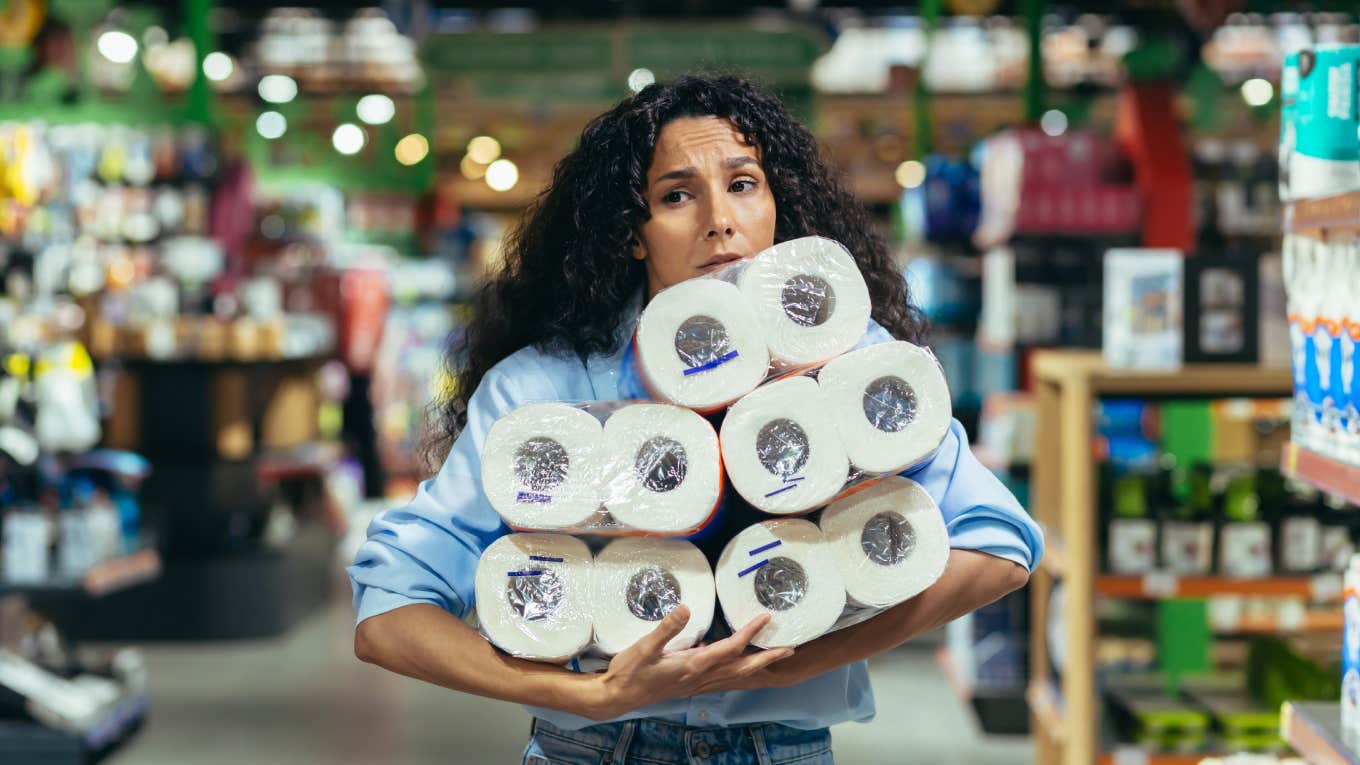Woman Says ‘Americans Need To Be Educated’ As People Start Panic-Buying Toilet Paper Again — ‘Please Stop It’
It seems history might be trying to repeat itself, but unfortunately, people don't realize what's actually going on.
 voronaman | Shutterstock
voronaman | Shutterstock We can all remember the pandemonium that ensued during those first few months of 2020 when we were all in lockdown because of the pandemic. People were unsure how long we had to remain inside of our homes and the future felt rather bleak and isolating. Lines in grocery stores were up and down the aisles as people started stocking up on necessities, which left nothing for others — especially when it came to toilet paper.
Unfortunately, it seems that amid a recent strike, Americans are falling back into old and panicked ways. This time, they're being met with an insistence not to repeat past mistakes.
A woman urged people to stop panic-buying toilet paper.
In a TikTok video, a content creator named Myra admitted that she was shocked to hear about the experience of a cashier during a recent grocery store trip, and how many people have been coming in and out in large droves.
"I'm leaving Publix and the nice cashier said, 'It has been swamped all day,' and I said, 'Huh, wonder why,'" Myra began in her video. She explained that hearing the Publix cashier's observation hadn't been a similar remark that she'd heard from a woman at the pharmacy only recently.
The cashier informed Myra that people were shopping and stocking up on certain items because of a strike, but expressed her disbelief at the fact that individuals were just mass-buying toilet paper and paper towels as they did during the announcement of quarantine back in 2020. Back then, it got to the point where grocery stores had to put up signs urging people to only take one package of toilet paper because of how quickly they were running out of them.
Myra expressed how frustrated she is by the lack of education with many people in this country.
"Americans need to be education," Myra wrote on her video. "We have plenty to go around, please stop it," she urged.
There does seem to be a reason why people feel inclined to start panic-buying. A 2021 study published by the National Institute of Health (NIH) found that toilet paper hoarding during the COVID-19 pandemic was mainly due to perceived scarcity, anxiety from the illness, greater selfishness, and "the intolerance of uncertainty."
Consumer psychologist Paul Marsden, per CNBC, explained that panic-buying is a form of "retail therapy" where consumers feel like they are "taking back control" in a situation that feels uncertain.
The port strike doesn't directly impact a toilet paper shortage.
According to CNN, nearly 50,000 members of the International Longshoremen’s Association (ILA) are on strike against the country's East and Gulf Coast ports. The strike is expected to stop the flow of a wide variety of goods over the docks of almost all cargo ports from Maine to Texas. It could also stop US exports flowing through those ports, hurting sales for many American companies.
However, due to this strike, reports of shortages have begun spreading, with photos showing empty shelves of toilet paper and paper towels.
What people fail to understand is that the port strike doesn't have any impact on the things that they're panic-buying. Experts previously told USA Today that while half of all U.S. ocean imports flow through the East Coast and Gulf ports means consumers may face higher prices and shortages, it isn't for things like toilet paper and paper towels. Instead, it would be for items like bananas, alcohol, seafood, electronics, pharmaceuticals, cars, auto parts, and machinery parts.
So everyone can calm down and stop worrying about not being able to find any rolls of toilet paper anytime soon. We don't need to recreate the misinformation and frenzy that happened during the pandemic, because it didn't help anyone and made things a lot worse for people who weren't able to get ahold of basic necessities and resources.
Nia Tipton is a Chicago-based entertainment, news, and lifestyle writer whose work delves into modern-day issues and experiences.

